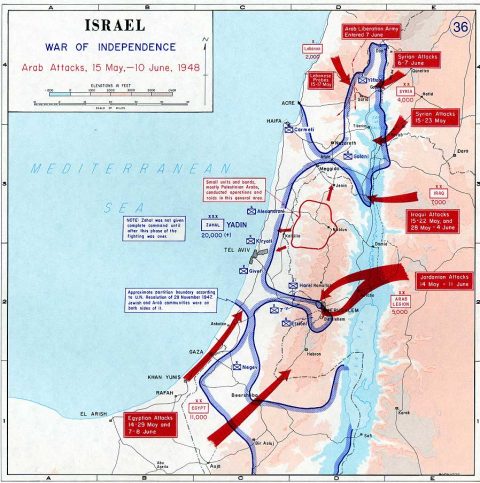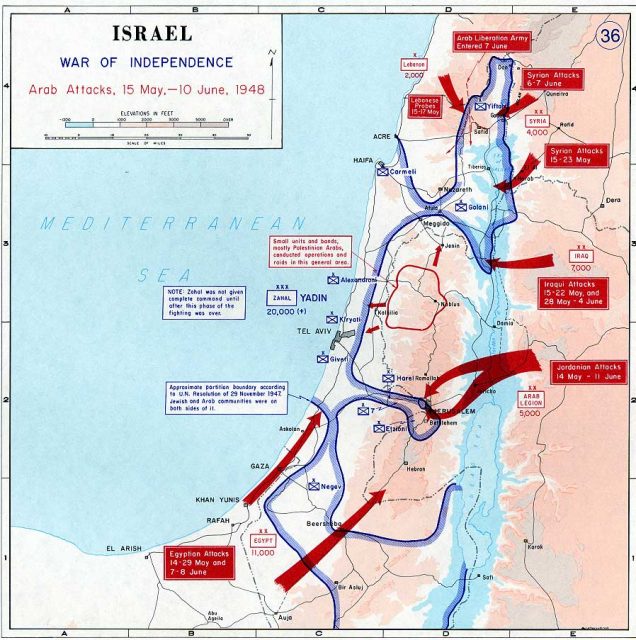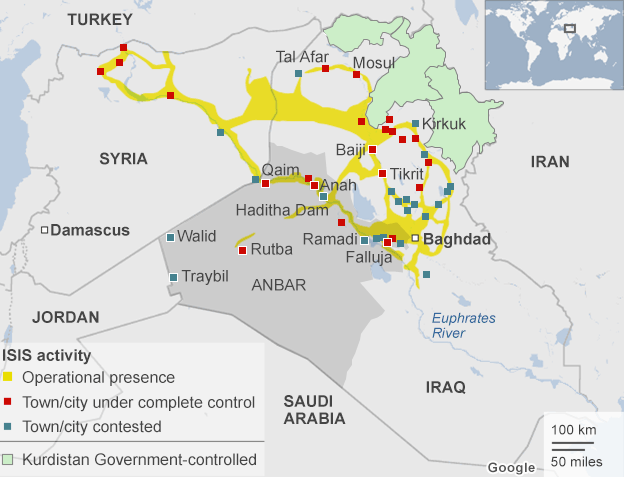TimeGhost History
Published 13 Apr 2025In 1948, the British departure from Palestine plunges the region into chaos. Amid bombings, massacres, and forced displacements, a brutal civil war escalates into the Arab-Israeli conflict, reshaping the Middle East forever. As Israel declares independence, Arab armies invade, and atrocities on both sides deepen hatred and tragedy. Can either side emerge victorious, or has the cycle of violence become unstoppable?
(more…)
April 15, 2025
How the UN Plan Tore Palestine Apart – W2W 20 – 1948 Q2
September 26, 2024
Why Three Arab Nations Lost the Six-Day War Against Israel
Real Time History
Published Jun 5, 2024In just six days in 1967 Israel managed to decisively defeat Egypt, Jordan and Syria in the Six Day War. In the process they expand the territory they control with the Golan Heights, Sinai, the West Bank, and Gaza.
(more…)
October 19, 2023
Why there are no regional refuges available to Gazan civilians
Ed West outlines the sad story of Palestinian civilians uprooted from their homes by the many conflicts that have convulsed the region:

Arab attacks in May and June 1948.
United States Military Academy Atlas, Link.
It is generally a good idea for refugees to be housed in neighbouring countries rather than on different continents, for a number of reasons, but we should be wary of casually stating that Arab states should house Gazans. In a difficult region many of these countries have already put themselves under enormous strain through acts of immense generosity, and none more so than Jordan.
[…]
The survival of Jordan’s monarchy has been one of the more surprising outcomes of the past few decades, and experts have repeatedly bet against it. The country has an unusually bad hand in many ways. Situated beside the disputed Holy Land, it lacks the natural resources of neighbouring Saudi Arabia and Iraq, while also being more remote than Lebanon or Syria, which had long been at the heart of Mediterranean trading networks and far more plugged into European markets.
But most of all it has suffered the destabilising effect of refugees. Abdullah is named after his great-grandfather, the first King of Jordan, whose assassination in 1951 forms the opening of Hussein’s autobiography; indeed he calls it “the most profound influence of my life”. He was just 15 years-old when he travelled with his grandfather to Jerusalem to perform Friday prayers, where the monarch was shot dead by a Palestinian. The gunman then fired at Hussein but the bullet struck a medal his grandfather had given him.
Abdullah I had ruled the new kingdom for just five years, and it endured an incredibly bad start with defeat in the 1948 Arab-Israeli war, which led to a surge of refugees. Estimates of exact numbers seem to vary hugely, but in Lion of Jordan, Avi Shlaim writes that 700,000 Palestinians left in 1948, and of these “450,000 ended up in Jordan, which did more than any other Arab state to help them resettle and integrate with the rest of society”.
He wrote: “The refugees in Jordan wanted to preserve their separate Palestinian identity, but this ran counter to Abdullah’s policy of ‘Jordanization’.” He gave them citizenship rights “but the refugees were a great burden on the weak Jordanian economy; it simply did not have the financial resources to cope with a humanitarian tragedy on such a vast scale.” Many ended up in resentful poverty and “the Palestinians thus became an important factor in domestic Jordanian politics”.
Another source suggests that in 1949, “Jordan welcomed approximately 900,000 refugees by amending the country’s 1928 Law of Nationality to grant equal citizenship to Palestinians; the 1954 Law of Jordanian Nationality later extended citizenship to Palestinians who arrived in Jordan after the 1949 addendum.”
After another defeat against Israel in 1967, up to 300,000 displaced Palestinians in the West Bank retained Jordanian citizenship, and today around 40% of the Jordanian population descend from Palestinian refugees, although the figure may be higher (again, they vary hugely). What seems certain is that about 40% of displaced Palestinians and their descendants live in Jordan, with another 10% in Syria (although many of those have since fled to Lebanon).
The Hashemites, unlike some Arab countries, were keen to integrate the newcomers and to avoid them having to endure a permanent refugee existence; that is why three-quarters of Palestinians in Jordan are Jordanian citizens, although Palestinians from Gaza aren’t, that area having been part of Egypt before the Six-Day War.
In contrast Palestinians who fled to Syria were not given citizenship, for all the talk of solidarity, and often remained in refugee camp-cities for decades (many of which were heavily affected by the Syrian war).
In Lebanon it was even worse; there the Palestinians could neither gain citizenship, nor in many cases access things like healthcare, education or work. The situation here was uniquely dangerous, because their arrival tipped the country’s incredibly delicate balance between Christians, Shia, Sunni and Druze; in 1975 the country descended into civil war, a horror that saw a modern example of shibboleths where Christian militiamen would present tomatoes to suspected Palestinians and ask them to pronounce the name.
This refugee surge had a destabilising effect on Jordan. Already in 1958 things were so bad that Hussein hoped to form a tripartite union with Saudi Arabia and Iraq to counter the influence of Gamal Abdel Nasser’s Egypt. Neither neighbour was too keen on the idea, and Saudi prince Abd al-Ilah remarked that “Hussein’s trouble stemmed from the fact that 70 per cent of his subjects were Palestinians with no loyalty to the throne”.
But in 1970, three years after the Six-Day War, it reached a crisis point, with the British ambassador commenting that “the mixture became so volatile that the container exploded”. There now came full civil war in Jordan between the army and the Palestinian fedayeen.
Jordan had become home to the Palestinian Liberation Organisation, but this umbrella group was itself split into different factions, Fatah being the largest and most moderate. They were reluctant to get involved in the internal affairs of other Arab states, but this was not the case with the more extreme Popular Front for the Liberation of Palestine led by Dr George Habash (who, as his name suggests, was a Christian) and the Marxist-Leninist Popular Democratic Front for the Liberation of Palestine (yes, it does get very Life of Brian).
October 24, 2022
The Beretta AR70
Forgotten Weapons
Published 2 May 2017After failing to acquire a license to produce the M16 rifle, Beretta worked with SIG from 1963 through 1968 to develop 5.56mm infantry rifles. When the companies parted ways, SIG went on to produce the SIG-540 and Beretta developed the AR-70. It was introduced on the market in 1972, and was adopted by the militaries of Jordan and Malaysia, as well as Italian special forces units (the Italian Army at large would adopt the 70/90 version in 1990).
The AR-70 takes several cues from the AK series of rifles, including the rock-in magazine with large rear paddle release and a two lug rotating bolt. In a somewhat unorthodox choice, the rifle uses a coil spring in tension for its mainspring, located around the gas piston and in front of the bolt. While this would likely cause heat-related problems in a light machine gun, it appears to have been acceptable in a rifle, as the improved 70/90 version maintain the same system. It does also allow simple use of folding or collapsing stocks, as there are no working parts in the stock.
Only a relatively small number of commercial AR70/223 rifles came into the United States in the 1980s, and they are a relatively unknown member of the black rifle family.
(more…)
January 3, 2021
First Arab – Israeli War 1948
Kings and Generals
Published 31 Aug 2019Support our channel and install the free-to-play PC game World of Tanks to get the in-game gifts: http://patron.me/KingsAndGeneralsWoT
Previously in our animated historical documentary series on modern warfare we have covered the Six-Day War of 1967, also known as the Third Arab-Israeli War http://bit.ly/30NfTOy This new 3d documentary will explain the events of the First Arab-Israeli War, which was fought in 1948-1949.
Creation of Israel: http://bit.ly/2ZApWFi
Arab countries after the World War II: http://bit.ly/2ZBW0bX
First Arab – Israeli War of 1948 – Political episode: http://bit.ly/2zyjAvsSupport us on Patreon: http://www.patreon.com/KingsandGenerals or Paypal: http://paypal.me/kingsandgenerals
We are grateful to our patrons and sponsors, who made this video possible: https://drive.google.com/open?id=1Jlq…
The video was made by our friend Leif Sick, while the script was written by Matt Hollis.
This video was narrated by Officially Devin (https://www.youtube.com/user/Official…)
Merch store ► teespring.com/stores/kingsandgenerals
Podcast ► Google Play: http://bit.ly/2QDF7y0 iTunes: https://apple.co/2QTuMNG
Twitter ► https://twitter.com/KingsGenerals
Instagram ► http://www.instagram.com/Kings_Generals
Sources:
Efraim Karsh – The Arab-Israeli Conflict: The Palestine War 1948
Benny Morris – A History of the First Arab-Israeli War 1948
Ahron Bregman – Israel’s Wars: A History Since 1947Production Music courtesy of Epidemic Sound: http://www.epidemicsound.com
#Documentary #ArabIsraeliWar #ColdWar
October 19, 2020
Tank Chats #82 Challenger 1 | The Tank Museum
The Tank Museum
Published 9 Aug 2019David Willey, The Tank Museum Curator, discusses the development and deployment of the UK’s Main Battle Tank from 1983 – 2001, the Challenger 1.
Challenger 1 was in service with the British Army and saw action during the First Gulf War. It remains in service with the Jordanian Army.
Support the work of The Tank Museum on Patreon: ► https://www.patreon.com/tankmuseum
Visit The Tank Museum SHOP: ► https://tankmuseumshop.org/
Twitter: ► https://twitter.com/TankMuseum
Instagram: ► https://www.instagram.com/tankmuseum/
Tiger Tank Blog: ► http://blog.tiger-tank.com/
Tank 100 First World War Centenary Blog: ► http://tank100.com/
October 3, 2020
Sir John Glubb (“Glubb Pasha”), general and amateur historical theorist
In Quillette, Leo Nicolletto considers the theories of Sir John Glubb (commonly known as “Glubb Pasha”):

Glubb Pasha at a parade of the Arab Legion’s honor guard of the Jordanian army at the palace.
Detail of an original photo by Willem van de Poll via Wikimedia Commons.
Pasha Glubb was an English army officer who spent the best part of his career serving the newly-independent governments of Iraq and Jordan. An avid — if amateur — historian, he developed a theory on hegemonic orders that he called the “Fate of Empires.” Comparing a series of ancient and modern empires, he concluded that their average lifespan was 10 generations — about 250 years — and that, despite great geographic, technological, religious, and cultural differences, all empires follow a general pattern as they expand, develop, and finally decline and collapse. Although Glubb himself was the first to acknowledge the risks of over-simplification in his generalised model, his observations aptly describe, in broad-brushstrokes, not only the fate of past empires, but the contemporary situation in global politics today, particularly regarding the West and China.
Glubb was agnostic on whether the “laws” of history he claimed to uncover were at all deterministic, but hoped that, by understanding how empires decline and collapse, modern citizens stood a chance of avoiding their typical fate. And so, I want to consider ways in which the predicted collapse of Western hegemony might be averted. It’s another question whether or not such a collapse ought to be avoided. Glubb — as a man of his time and class — had imperialist tendencies, though his immersion in foreign cultures gave him an open-mindedness that is generally lacking in the present-day imperialists of Western conservative parties. At any rate, as we go along, I’ll suggest that if the West is to avoid the fate of past empires, it needs to stop acting like a typical empire. And to do that, it needs to move as far as possible from modern conservative policy — and its emphasis on corporate profit and economic growth — as it can.
* * *Glubb noted that empires tend to begin with a “breakout” phase, in which an insignificant nation on the margins of an established power — say, the Macedonians before Alexander, the Arabs before Muhammed, or the Mongols before Genghis Khan — suddenly overwhelms its neighbours. This “Age of Pioneers” becomes an “Age of Conquests” when, encouraged by early successes, the rising nation takes over the power structures of its conquered neighbour and continues to expand. Glubb noted that successful new empires are not motivated simply by loot and plunder. With an emphasis on “noble” virtues — adventurousness, courage, strength, and, importantly, honesty — rising empires don’t want simply to subdue the established power; they want to become as they perceive them to be: advanced, technological hegemons. The Arabs took over Greek and Persian institutions — as the Mongols would take over Chinese and Islamic institutions — to become masters of a revitalised and expanded civilisation.
A rising empire, argued Glubb, has at its advantage an optimistic sense of initiative, and a spirit of improvisation, that contrasts with the defensive deference to tradition found in more established powers, who have too much to lose by experimentation. The rising power, he claimed, is also typically marked by a racial homogeneity, and its members consequently feel a strong sense of duty and loyalty to their tribe. This frequently evolves into a sort of “ruling caste,” as the conquerors situate themselves at the head of the pre-existing societal order of the conquered, as happened in India, first with the Mughals, and later with the British.
Having established control over large, diverse territories, the new pax impera creates ideal conditions for trade. And so begins what Glubb called the “Age of Commerce.” The desire for honour and glory gradually becomes a desire for material riches. At first, the conquering class may participate only indirectly in such commerce. Their military success has made the roads and seas safe for merchants, whom they tax and protect, but from whom they remain aloof — indeed, it’s intriguing how low on the social scale merchants and businessmen are considered in many pre-modern cultures. But sooner or later, seeing the potential for riches, the ruling class can’t but get itself involved. However, Glubb claimed that at these still-early stages of the “Age of Commerce,” material gain is still seen in terms of national glory, an extension of political conquest. “Noble” virtues continue to be taught and idealised, above all a sense of duty to the nation.
The “Age of Commerce” thus gives way to an “Age of Affluence,” marked by great civic works and building projects, and investments in art and culture, as the rich look for ways to spend their newfound wealth. In our own day, this depiction aptly fits China. The ruling class of the Communist Party — long aloof, at least in theory, from material excess — has joined forces with the commercial classes to promote not just prosperity but fantastic wealth. All the same, many Chinese — in business as well as in engineering or research — describe their motivations just as much as a duty to the country as for their own or their family’s benefit. Success in business is a source of national pride.
Though perhaps not for long.
August 20, 2020
Britain, France, and Israel’s War Collusion | The Suez Crisis | Prelude 2
TimeGhost History
Published 19 Aug 2020Britain and France are becoming increasingly worried about the growing threat of Egypt to the Middle East and Africa — they are not alone — Israel is also worried. Israel’s close proximity to Egypt makes them a valuable secret accomplice in finding justification for a war that will seek to remove Gamal Abdel Nasser.
Join us on Patreon: https://www.patreon.com/TimeGhostHistory
Hosted by: Indy Neidell
Written by: Joram Appel and Francis van Berkel
Director: Astrid Deinhard
Producers: Astrid Deinhard and Spartacus Olsson
Executive Producers: Astrid Deinhard, Indy Neidell, Spartacus Olsson, Bodo Rittenauer
Creative Producer: Joram Appel
Post-Production Director: Wieke Kapteijns
Research by: Joram Appel
Image Research: Ian Irungu, Shaun Harrison & Daniel Weiss
Edited by: Daniel Weiss
Sound design: Marek Kamiński
Maps: Ryan WeatherbyColorizations:
– Mikolaj Uchman
– Daniel Weiss
– Carlos Ortega Pereira (BlauColorizations) – https://www.instagram.com/blaucoloriz…
– Norman Stewart – https://oldtimesincolor.blogspot.com/Sources:
National Archives NARA
Library of Congress Geography and Maps Department
Munich_conference – Mareček2000From the Noun Project:
– Paris – Vonn WeisenbergerSoundtracks from Epidemic Sound:
– “Devil’s Disgrace” – Deskant
– “Dreamless Nights” – The New Fools
– “Where Kings Walk” – Jon Sumner
– “Invocation” – Deskant
– “Call of Muezzin” – Sight of Wonders
– “Crying Winds” – Deskant
– “Divine Serpent” – Deskant
– “Pepper Seeds” – Rune Dale
– “Searching Through Sand” – Deskant
– “Scented Nectar” – Rune Dale
– “As the Rivers Collapse” – DeskantArchive by Screenocean/Reuters https://www.screenocean.com.
A TimeGhost chronological documentary produced by OnLion Entertainment GmbH.
From the comments:
TimeGhost History
2 days ago
“And now for our second prologue episode on the Suez Crisis. This one is all about a conspiracy where three countries believe they can fool the US, USSR, and entire UN all at the same time. Hindsight is of course 20/20, but it really is astounding that Britain, France, and Israel thought they could start a war with another member of the UN with a completedly engineered casus belli. This isn’t the first or last time something like this has happened in the history of international relations. Still, the pure audacity of Britain and France in their plans here really does seem quite unique. Can you guys think of any other examples of this kind of thing?”Cheers,
Francis.
April 30, 2020
Palestine, 1948 – the origins of the still-ongoing refugee issue
In Quillette, Benjamin Kerstein reviews a new book by Adi Schwartz and Einat Wilf, which covers the origins of the Palestinian refugee problem that still hinders any kind of lasting peace between Israel and neighbouring Arab countries:

Arab attacks in May and June 1948.
United States Military Academy Atlas, Link.
Wilf and Schwartz’s comprehensive history of the refugee issue begins with the UN’s adoption in November 1947 of a plan to partition British Mandatory Palestine into an Arab state and a slightly smaller Jewish state. Violence erupted shortly after, and once the British left the territory, hostilities escalated into a full-scale war, during which fighting between the Zionist movement’s Haganah defense force and various Palestinian Arab militias was followed by an invasion by the surrounding Arab countries. Israel prevailed with truncated borders, but the Arab world remained steadfastly committed to the new state’s elimination. Refugees are a byproduct of every military conflict, but the exodus of the Palestinian Arabs would have uniquely consequential ramifications that continue to haunt the conflict and thwart its resolution to this day.
It is now fashionable for historians sympathetic to the Palestinian narrative to downplay the threat that the Jewish community in Mandatory Palestine — the Yishuv — faced in the 1948 conflict. Wilf and Schwartz show conclusively that such attempts, be they sincere or dishonest, are simply untrue. The secretary-general of the Arab League, they note, openly stated that the war was intended to be genocidal, saying, “This will be a war of extermination and momentous massacre, which will be spoken of like the Mongolian massacre and the Crusades.” Meanwhile, the Palestinian Arabs’ most influential leader, the Nazi collaborator Mufti Hajj Amin al-Husseini, said the Arabs would “continue to fight until the Zionists are eliminated, and the whole of Palestine is a purely Arab state.”
Correctly believing that their individual and collective existence were threatened, the Zionist militias, which eventually coalesced into the nascent Israel Defense Forces, sometimes destroyed villages and expelled their inhabitants, and there was a mass flight of Arabs from cities like Haifa and Jaffa. By the end of the war, what emerged was a Jewish state with a comfortable Jewish majority along with a substantial though not overwhelming Arab minority. The refugees, for the most part, were settled in camps in the surrounding Arab nations of Syria, Lebanon, and Jordan, as well as in the West Bank and Gaza, which were occupied by Jordan and Egypt, respectively. Jordan alone granted the refugees citizenship and absorbed them into the general population. Elsewhere, however, refugees remained stateless, left to the tender mercies of the international community.
From the beginning, pressure was brought to bear on Israel to allow the refugees to return, and from the beginning Israel steadfastly refused to do so, believing that it would destroy Israel’s Jewish character and precipitate another, perhaps even more brutal war. Wilf and Schwartz reveal that this was in fact precisely the Arabs’ intention. The Arab media spoke openly of establishing a “fifth column” within Israel by repatriating the refugees, and the authors record Palestinian historian Rashid Khalidi’s view that the Arab mood at the time made it clear that the right of return “was clearly premised” on “the dissolution of Israel.” In addition, the Palestinian leadership was initially unenthusiastic about the return of refugees, which they believed would imply a recognition of Israel’s existence to which they remained implacably opposed. For a society deeply rooted in concepts of honor, dignity, and humiliation, such an acknowledgement of defeat was simply unthinkable.
Contrary to the claims of Israel’s opponents, Wilf and Schwartz persuasively argue that the new state was under no moral or legal obligation to allow the refugees to return. During the late 1940s and early 1950s, the concept of population exchange between belligerent national groups in conflict over territory was considered lamentable but inevitable. Consequently, the laws pertaining to refugees often forbade the opposite: States could not force refugees to return to places when to do so might cause further conflict or instability. Emphasis was therefore on resettlement in host countries, usually with a corresponding ethnic or religious majority. This held true for the mass expulsions of ethnic Germans from Poland after World War II, and the almost contemporaneous exodus of both Muslims and Hindus to Pakistan and India, respectively. Importantly, it also applied to the hundreds of thousands of Jewish refugees expelled from Arab and Muslim countries following the 1948 war, who were resettled in the new State of Israel.
Once the Arab and Palestinian position on return shifted from a fear of recognizing Israel to the idea of building a fifth column within the state to wage an indefinite war against Zionism, Wilf and Schwartz write, “The state of Israel … was being asked by the Arabs to perform an extraordinary act: it was called on to admit to its sovereign territory hundreds of thousands of Arabs, against international norms of the time, without a peace treaty, and while the Palestinians and the Arab world continued to threaten it with another war — even calling the refugees a pioneer force toward this end.”
Although anti-Zionists today insist that Israel’s refusal to accept a return of the refugees was a uniquely heinous violation of human rights and international law, it was entirely consistent with the moral and legal norms of the time.
May 10, 2019
“Counterstrike” – The Six-Day War – Sabaton History 014
Sabaton History
Published on 9 May 2019When Egyptian president Nasser closes an important sea route for their neighbouring state of Israel in May 1967, Israel argues that a military attack on Egypt is justified. During the following six days in June 1967, Israel embarks on a war against Egypt, Syria and Jordan. The Sabaton song “Counterstrike” (on the Primo Victoria album) describes this short but influential and controversial conflict.
Support Sabaton History on Patreon: https://www.patreon.com/sabatonhistory
Check out the trailer for Sabaton’s new album The Great War right here: https://www.youtube.com/watch?v=HCZP1…
Watch more videos on the Sabaton YouTube channel: https://www.youtube.com/user/Sabaton?…
Listen to Sabaton on Spotify: http://smarturl.it/SabatonSpotify
Official Sabaton Merchandise Shop: http://bit.ly/SabatonOfficialShopHosted by: Indy Neidell
Written by: Markus Linke and Indy Neidell
Directed by: Astrid Deinhard and Wieke Kapteijns
Produced by: Pär Sundström, Astrid Deinhard and Spartacus Olsson
Creative Producer: Joram Appel
Executive Producers: Pär Sundström, Joakim Broden, Tomas Sunmo, Indy Neidell, Astrid Deinhard, and Spartacus Olsson
Maps by: Eastory
Edited by: Iryna Dulka
Sound Editing by: Marek KaminskiEastory YouTube Channel: https://www.youtube.com/channel/UCEly…
Archive by: Reuters/Screenocean https://www.screenocean.com
Music by Sabaton.Sources:
National Photo Collection of Israel
D326-011
Israel Defence Forces Archives, Ministry of Defence Archives
Goverment Press Office of Israel (Also for Thumbnail)An OnLion Entertainment GmbH and Raging Beaver Publishing AB co-Production.
© Raging Beaver Publishing AB, 2019 – all rights reserved.
From the comments:
Sabaton History
This might be the most controversial topic we have tackled to this date. We are aware of the many controversies and debate surrounding the Six-Day War, including debates surrounding the justification of the Israeli “preemptive strike”, the role that foreign/western nations played in the conflict and warcrimes that might have been committed by both sides. We decided to stay away from these debates in this video, and stick to the historical narrative. While we highly value (academic) debate and discussion, we don’t allow for racism, xenophobia, anti-semitism and partisan revisionism. Also, please try to stay away from modern partisan politics as far as possible.Thanks for reading!
Cheers!
March 7, 2019
Line Of Fire The Six Day War
sixoctober war
Published on 4 Jul 2013After the 1956 Suez Crisis, Egypt agreed to the stationing of a United Nations Emergency Force (UNEF) in the Sinai to ensure all parties would comply with the 1949 Armistice Agreements. In the following years there were numerous minor border clashes between Israel and its Arab neighbors, particularly Syria. In early November, 1966, Syria signed a mutual defense agreement with Egypt. Soon thereafter, in response to Palestine Liberation Organization (PLO) guerilla activity, including a mine attack that left three dead, the Israeli Defense Force (IDF) attacked the city of as-Samu in the Jordanian-occupied West Bank. Jordanian units that engaged the Israelis were quickly beaten back. King Hussein of Jordan criticized Egyptian President Gamal Abdel Nasser for failing to come to Jordan’s aid, and “hiding behind UNEF skirts”.
In May 1967, Nasser received false reports from the Soviet Union that Israel was massing on the Syrian border. Nasser began massing his troops in the Sinai Peninsula on Israel’s border (May 16), expelled the UNEF force from Gaza and Sinai (May 19), and took up UNEF positions at Sharm el-Sheikh, overlooking the Straits of Tiran. UN Secretary-General U Thant proposed that the UNEF force be redeployed on the Israeli side of the border, but this was rejected by Israel despite U.S. pressure. Israel reiterated declarations made in 1957 that any closure of the Straits would be considered an act of war, or a justification for war. Nasser declared the Straits closed to Israeli shipping on May. 22-23. On 27 May he stated “Our basic objective will be the destruction of Israel. The Arab people want to fight.” On May 30, Jordan and Egypt signed a defense pact. The following day, at Jordan’s invitation, the Iraqi army began deploying troops and armored units in Jordan. They were later reinforced by an Egyptian contingent. On June 1, Israel formed a National Unity Government by widening its cabinet, and on June 4 the decision was made to go to war. The next morning, Israel launched Operation Focus, a large-scale surprise
October 25, 2018
QotD: The unique situation of Israel
In 1948, one internationally recognized sovereign state (Israel) was invaded by the armies of various neighboring sovereign states (Jordan, Egypt, Syria, Iraq, Lebanon). At the end of that war, much of the former British Mandate of Palestine was in Israeli hands, but the West Bank wound up with Jordan and the Gaza Strip with Egypt. Over the next two decades, nobody referred to Egypt’s or Jordan’s exercise of its sovereignty in those lands under loaded terms such as “settlement”.
In 1967, the Arabs tried again to wipe out Israel, and again failed. And this time their defeat was even more total: Egypt lost the Gaza Strip (and the Sinai) and Jordan lost the West Bank. That was half-a-century ago. One of the most basic laws of war is: to the victor the spoils. If you launch a war and you lose, then the guy who took your territory is the one who determines its future. Instead, the “international community” decided to intervene in the matter in a way it has in no other supposed boundary dispute.
Thus began the “Palestiniazation” of the problem. Uniquely in such matters, the victorious sovereign state is forbidden from returning the spoils of war to the defeated sovereign states – Jordan and Egypt. Instead, it can only treat with the designated representatives of “Palestine”, who … have no interest in nation-building, or capacity for it, only in Jew-killing.
To repeat: the “international community”‘s treatment of this issue is like no other boundary dispute of the last 200 years. Maybe that’s because this situation is unique to one small patch of land in the Middle East. Or maybe it’s because the “international community” really really doesn’t like Jews.
I say that Israel (independent since 1948), Jordan (1946) and Egypt (1922) are all sovereign states entitled to act in their own interests, and live with the consequences – especially after two or three generations.
Mark Steyn, “License to Dye”, Steyn Online, 2016-12-30.
May 23, 2017
Remembering the Six-Day War
With the 50th anniversary coming up in a few weeks, Jerrold L. Sobel provides a retrospective on the Arab-Israeli war of 1967:
For those of us alive during those daunting days in May 1967 leading up to the war, it was a period in time we will never forget, nor should we. Its ramifications were and are germane to this very day.
No discussion of the Six-Day War can be made without the background of its major protagonist, Gamal Abdel Nasser. Whereas today ISIS is attempting to dominate the Islamic world under an Islamic Caliphate, Nasser, then president of Egypt, attempted to do the same but with a secular approach. On July 23, 1952, he and a group of officers staged a coup and ousted the Egyptian King Farouk. Although the real leader, Nasser initially remained in the background but in fact was instrumental in abolishing the monarchy in 1953. The following year he came out of the shadows to assume absolute power and began instituting far-reaching economic reforms which instantly made him the darling of the Arab world. By 1956 his relations with the West had deteriorated to the point that he brazenly nationalized the Suez Canal, prompting an invasion by England, France, and Israel. Under pressure from the U.S., these forces withdrew, and a United Nations Emergency force was subsequently placed as a buffer between Egypt and Israel; the withdrawal of which would play a pivotal role in the conflict 11 years later.
At the pinnacle of his popularity, Nasser joined with Syria forming what became the United Arab Republic (U.A.R.), a move which encouraged the Syrians to ramp up incessant attacks against Israel from their vantage point on the Golan Heights, towering 3,000 feet above the Galilee. No Israeli farm or Kibbutz was spared the wrath of Syrian artillery. Much like the residents of Sderot and other Israeli towns adjacent to Gaza today, Jews were forced to sleep and conduct their lives in bomb shelters.
[…]
In the early hours of June 5, 1967 Israel launched a preemptive air strike on the air forces of Egypt, Jordan, and Syria with devastating effect. Five days later the armies of these nations along with Iraq, which also joined the fray were crushed and forced to sue for a ceasefire. The war may have taken only six days but its ramifications and similarities to today’s Middle East conflict is unquestionable. What were the accomplishments?
- For the first time since prior to the Ottoman Empire, Jews have unfettered access to their Holy sites and a united Jerusalem their ancient capital.
- The indefensible 1948 armistice line which bisected Israel from the Jordan River to within 9 miles of the Mediterranean Sea had been abrogated.
- Israel took control of Judea and Samaria, which was illegally annexed by Jordan following the ’48 armistice.
- Israel commands the highly defensible Jordan Valley where terrorist attacks had emanated from both Jordan and Syria.
- Israel was able to trade the Sinai Peninsula for a peace treaty with her main antagonist, Egypt.
- The Golan Heights, the onetime haven for terrorists and Syrian artillery, was annexed and have remained relatively quiet for the past 50 years.
- Most importantly, by winning the war decisively, Israel staved off what was intended to be another mass genocide of the Jewish people….
What was not accomplished?
- An end to terrorism.
- An end to Anti-Semitic cartoons and rhetoric throughout much of the Islamic world, particularly Iran.
- An end of vilification of Israel by the Palestinian leadership, media, and educational system.
- A Palestinian leader willing to recognize Israel as the homeland of the Jewish people.
- A United Nations only united in castigating the only true democracy in the Middle East.
- A total negation of slander on campus against Jews masked under the pretense of Anti-Zionism; particularly the BDS movement.
Despite these and other seemingly irreconcilable problems, winning the Six-Day War has allowed the Jewish state to survive and rise from its fledgling third-world status into a technological, economic, and military behemoth; an island of democratic renaissance surrounded by a sea of despair.
June 18, 2015
Six Days in June
Published on 23 Feb 2014
Six Day War – Israeli victory – Documentary
The shooting lasted on six tense days in June 1967, but the Six Day War has never really ended. Every crisis that has ripped through this region in the ensuing decades stems from those six fateful days. On its 40th anniversary, the region remains trapped in conflict and is every bit as explosive as it was in 1967. “Six Day War” chronicles the events of forty years ago with a fresh historical perspective. Beginning with the buildup for the war, and the political and military maneuvering of Israeli Prime Minister Levi Eshkol and Egyptian President Jame Adel Nasser, the film takes us through the six days of fighting, the war with Jordan, the occupation of the West Bank and the annexation of Jerusalem. Featuring stunning archival footage and first-hand accounts of the war from both the Israeli and Arab soldiers who fought it, “Six Day War” explores how these events became the flash point in history that reshaped the regional political landscape, destroyed old systems and brought new forces to the fore.
June 27, 2014
Possible next moves for ISIS
Charles Lister provides some ideas on what ISIS will do next after its stunning run of insurgent successes against the Iraqi military:
It is the wealthiest militant organisation in the world; it controls large swathes of territory — stretching from al-Bab in eastern Aleppo province in Syria to as far as Suleiman Bek 415 miles (670km) away in Iraq’s Salahuddin province — and it explicitly wants to establish an Islamic state.
In the immediate term, Isis will seek to sustain momentum in Iraq through further acquisitions of territory and finance-earning assets.
But crucially, Isis is not the only actor involved in fighting against the Iraqi government. Despite a few isolated clashes, a “coalition of convenience” — broadly encompassing Islamists, Sufis, Baathists, and tribes — has come to existentially undermine the legitimacy of Prime Minister Nouri Maliki.
How long this loose coalition holds will determine the nature of Isis’ role in what has effectively become a Sunni uprising in Iraq.
[…]
An immediate objective for Isis will be to cement its control over border towns on both sides.
Recent Isis incursions around Albu Kamal in Syria, and the defection to Isis of several key Nusra Front members in that town symbolises exactly the strategy Isis will likely seek to conduct — that of exploiting its sky-high reputation to undermine competing groups in strategically-valuable areas







